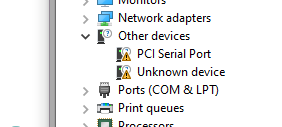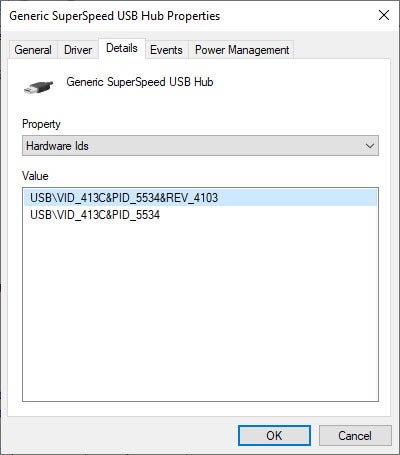 "Rusty Vandura - www.tinyurl.com/keepoppo" (rustyvandura)
"Rusty Vandura - www.tinyurl.com/keepoppo" (rustyvandura)
08/21/2019 at 13:00 ē Filed to: None
 0
0
 15
15
 "Rusty Vandura - www.tinyurl.com/keepoppo" (rustyvandura)
"Rusty Vandura - www.tinyurl.com/keepoppo" (rustyvandura)
08/21/2019 at 13:00 ē Filed to: None |  0 0
|  15 15 |

This is a Dell Latitude E4310, FWIW. Can anyone offer me any clues on what to search for or how to identify the missing drivers here?
 Full of the sound of the Gran Fury, signifying nothing.
> Rusty Vandura - www.tinyurl.com/keepoppo
Full of the sound of the Gran Fury, signifying nothing.
> Rusty Vandura - www.tinyurl.com/keepoppo
08/21/2019 at 13:07 |
|
You can try a free app like Driver Booster or get the details from Windows and do a search on the unique identifier for the device. Iím not at home right now so I canít give you the exact thing to look for, but itís under properties for the device in question, just a right-click away.
 Tripper
> Rusty Vandura - www.tinyurl.com/keepoppo
Tripper
> Rusty Vandura - www.tinyurl.com/keepoppo
08/21/2019 at 13:08 |
|

Copy and google the hardware ids. A bunch of fraud driver sites will come up but somewhere in there it will tell you that itís an ďintel xxx wifi driverĒ or something. Then go to dell.com, enter your service tag, and locate that driver.
EDIT: You can also let dell scan your pc and it will update those drivers.
 TheTurbochargedSquirrel
> Rusty Vandura - www.tinyurl.com/keepoppo
TheTurbochargedSquirrel
> Rusty Vandura - www.tinyurl.com/keepoppo
08/21/2019 at 13:08 |
|
Did you try right clicking the devices, update drivers, and then seeing if Windows can find anything on the web for them? Thatís usually pretty good at finding missing drivers.
If not you are going to have to go to the Dell support site for your machine and download the drivers. PCI Serial Port and Unknown device is going to be one of the more obscure items. Something like chipset, Intel ME, SMbus, etc. Iíd start by crossreferencing the devices listed as having drivers with the drivers listed on Dellís site and then grabbing anything from Dellís site that doesnít appear to have a match listed in Device Manager.
 facw
> Rusty Vandura - www.tinyurl.com/keepoppo
facw
> Rusty Vandura - www.tinyurl.com/keepoppo
08/21/2019 at 13:10 |
|
Best option is to go to Dell, enter your model/number/service tag/etc (I think they have software that can scan for it), and then download all the drivers for your machine.
 RallyDarkstrike - Fan of 2-cyl FIATs, Eastern Bloc & Kei cars
> Rusty Vandura - www.tinyurl.com/keepoppo
RallyDarkstrike - Fan of 2-cyl FIATs, Eastern Bloc & Kei cars
> Rusty Vandura - www.tinyurl.com/keepoppo
08/21/2019 at 13:14 |
|
Was this a fresh install?
 Nibby
> Rusty Vandura - www.tinyurl.com/keepoppo
Nibby
> Rusty Vandura - www.tinyurl.com/keepoppo
08/21/2019 at 13:15 |
|
probably the management interface drivers
 RallyDarkstrike - Fan of 2-cyl FIATs, Eastern Bloc & Kei cars
> facw
RallyDarkstrike - Fan of 2-cyl FIATs, Eastern Bloc & Kei cars
> facw
08/21/2019 at 13:15 |
|
Agreed, my guess is something like some sort of chipset driver or card reader or the sort.
 functionoverfashion
> facw
functionoverfashion
> facw
08/21/2019 at 13:18 |
|
Dell does have software that will do this. You go to support.dell.com and download SupportAssist which detects your service tag and all your local hardware, then suggests a list of drivers, and because youíre using Dellís tool, it wonít be spam/viruses/bloatware/porn. I do this often †for computers at work. Most often I just download a few specific ones Iím looking for to solve a specific problem, e.g. network connectivity.†
 Rusty Vandura - www.tinyurl.com/keepoppo
> functionoverfashion
Rusty Vandura - www.tinyurl.com/keepoppo
> functionoverfashion
08/21/2019 at 14:04 |
|
They donít have their s**t up to date for Win 10. I shouldíve put that in my initial post.
 Rusty Vandura - www.tinyurl.com/keepoppo
> functionoverfashion
Rusty Vandura - www.tinyurl.com/keepoppo
> functionoverfashion
08/21/2019 at 14:05 |
|
They donít have Win10 drivers for this model. Having to go to the next level. I found a driver in a similar situation on HPís site for a Dell laptop recently.
 Rusty Vandura - www.tinyurl.com/keepoppo
> Nibby
Rusty Vandura - www.tinyurl.com/keepoppo
> Nibby
08/21/2019 at 14:40 |
|
Thereís this certain group of drivers, SOL, LOL, AMT, Something †Vault, that are perennially a problem on Dell PCs.
 Rusty Vandura - www.tinyurl.com/keepoppo
> RallyDarkstrike - Fan of 2-cyl FIATs, Eastern Bloc & Kei cars
Rusty Vandura - www.tinyurl.com/keepoppo
> RallyDarkstrike - Fan of 2-cyl FIATs, Eastern Bloc & Kei cars
08/21/2019 at 14:42 |
|
Upgrade. Iíve upgraded six or seven machines to Win 10 since May. Either way, clean installation or upgrade, has had issues one kind or another. One machine I did a clean install and there is a driver or two that I just cannot find, in spite of Dell greenlighting the model for Windows 10.
 RallyDarkstrike - Fan of 2-cyl FIATs, Eastern Bloc & Kei cars
> Rusty Vandura - www.tinyurl.com/keepoppo
RallyDarkstrike - Fan of 2-cyl FIATs, Eastern Bloc & Kei cars
> Rusty Vandura - www.tinyurl.com/keepoppo
08/21/2019 at 15:36 |
|
Did you check Dellís website rather than just
Windows Update
? Also, as a hint, Windows 8 drivers will often work on Win10 even though they arenít Ďsupposedí to.
 Rusty Vandura - www.tinyurl.com/keepoppo
> RallyDarkstrike - Fan of 2-cyl FIATs, Eastern Bloc & Kei cars
Rusty Vandura - www.tinyurl.com/keepoppo
> RallyDarkstrike - Fan of 2-cyl FIATs, Eastern Bloc & Kei cars
08/21/2019 at 16:11 |
|
Yes, Dellís site and lots of web searching.
 Rusty Vandura - www.tinyurl.com/keepoppo
> Full of the sound of the Gran Fury, signifying nothing.
Rusty Vandura - www.tinyurl.com/keepoppo
> Full of the sound of the Gran Fury, signifying nothing.
08/21/2019 at 16:12 |
|
That seems like the bomb app. Hopefully, itís not written by Russian hacker trolls and now I have a bunch of exploits in my machine...
Was very effective.